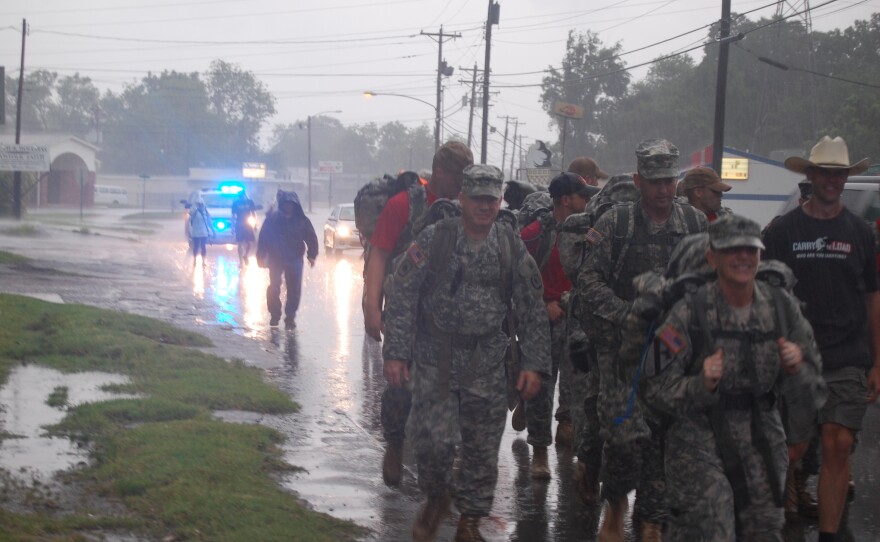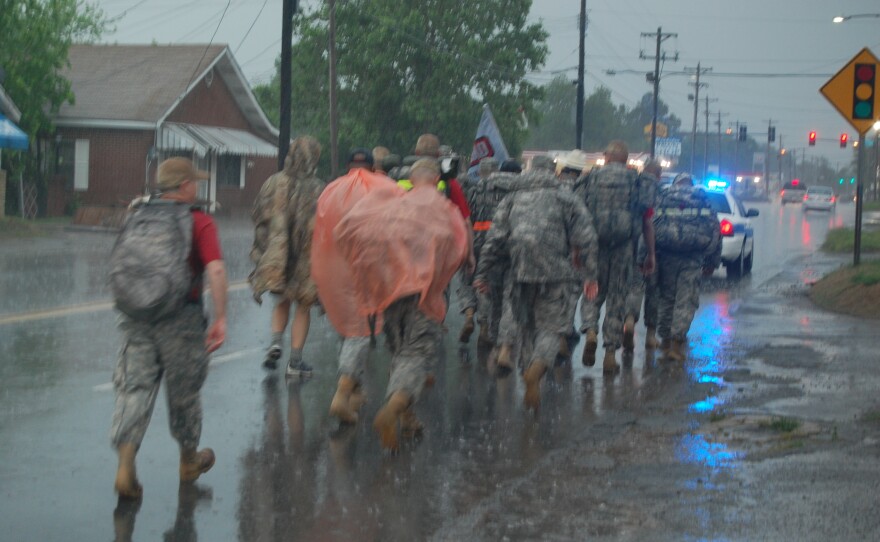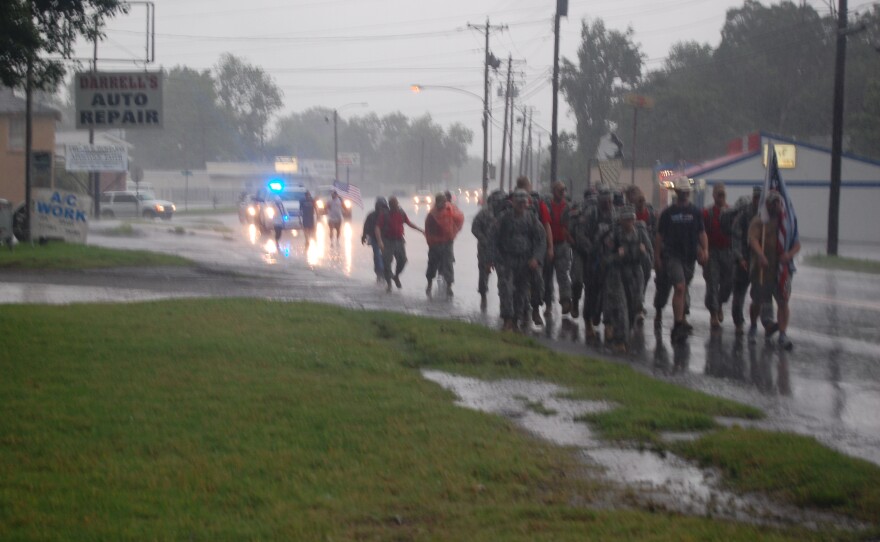In observance of Memorial Day an organization called Carry the Load trekked over two thousand miles from West Point to Dallas over twenty seven days.
KUAR's Jacob Kauffman met up with Arkansas sponsor, and sister of a soldier killed in action, Emily Reeves along a twenty mile path winding through Central Arkansas.
Jacob Kauffman: The fifty or so people marching through Arkansas in honor of the nation's military, police, and fire departments weren't greeted with the friendliest of skies.
Emily Reeves: This is our 6 p.m. leg where it has started pouring on us and thundering. Now we're a little worried about lightning. But we're gonna keep moving on. I've already rubbed blisters on my heels and I'm pretty wet but I'm enjoying it. I'm enjoying seeing all the people come out here. They said last year only two people did this leg so you can see we've grown quite a bit.
Jacob Kauffman: Emily Reeves' dad, Jim, drove from Shreveport, Louisiana to walk with his daughter in honor of his son Rob Reeves, who was killed at the age of thirty two.
Jim Reeves: Well, if we do all of the legs we will have done twenty miles. I don't know that I can do the full twenty miles. I'm kind of fat and old for that, and out of shape. But, I'm gonna give it my best.
Emily Reeves: I'm going to do fifteen, at least fifteen.
Jacob Kauffman: Carry the Load organizer and Navy Veteran Clint Bruce introduced Carry the Load to the Reeves family. Jim Reeves says Bruce's message about the meaning of Memorial Day resonates with him.
Jim Reeves: We met Clint Bruce last summer and he explained about taking Memorial Day back and what he had started. My son, her brother, a Navy SEAL was killed in August of 2011 and it just seems like that Memorial Day, has always meant a lot to me, but it means even more now. This is just a way to pay tribute to those people who protect us.
Jacob Kauffman: Before the march Emily Reeves, who is 14 months younger than her brother, explained the circumstances of her brother's death at her office in downtown Little Rock. Rob Reeves, a member of SEAL Team Six, was killed in Afghanistan along with 30 others when his helicopter was shot down in Afghanistan on August 6th, 2011.
AP News Report: Officials say the helicopter was apparently shot down by insurgents in the eastern part of the country [Afghanistan]. It is the single deadliest incident for U.S. forces during the decade long war.
Emily Reeves: We had a childhood friend who had also joined who was on the helicopter actually with him when it was shot down and also passed away. Which is very unusual for two guys from the same town.
Jacob Kauffman: In large part observing Memorial Day is meant to serve as a healing or cathartic experience for the families and friends of soldiers killed in action. It's also a reminder of the inherent burdens and sacrifices warfare entails. Staff Sergeant Walker from Georgia was one of twenty or so soldiers walking along the route with the Reeves family. Walker commented on what he believes is an inability for a home front population to adequately understand the burdens of war.
Walker: A few do and a few don't. Until you go and see what's happening they'll never understand. Never. So, you come back and try to tell them, they still won't understand what's going on.
Jacob Kauffman: Walker's experiences mirror those of so many veterans from Iraq and Afghanistan. Walker says he takes part in the relay for those he know who died and for those who are still oversees after over a decade of conflict.
Walker: I went to Iraq in '05 and '06 and we lost three over there, while we were there. So, it means a lot to do stuff like this. When we had to board up who, who we lost, it was really tragic, but, you know. People are still thinking about it. Everyday they come around, somebody posting on Facebook we lost them in Iraq, you know. There were three of them.
Jacob Kauffman: Emily Reeves has come to a similar conclusion as Staff Sergeant Walker on getting people to understand the costs of war. Back at her office Reeves said reaching military-age civilians is an especially tough challenge.
Emily Reeves: I knew that I could get the veteran's organizations to get behind the movement because they've always been passionate about it. But it's our younger age group that hasn't had to deal with a personal friend of a personal tragedy like war was for our older veterans. And it is a really hard thing to do for people to know that. Because even when they know someone in the military they don't necessarily know someone who's died in action.
Jacob Kauffman: The all volunteer structure of our military presents many military families with a unique burden and pride. The immediate effects of war in the modern era are increasingly being felt by less and less Americans. But, Emily Reeves says she is acutely aware of this fact and how it relates to her family.
Emily Reeves: We were not a military family, we did not have other people in our family that served in the military. So, I would say very selfishly I don't think it's fair that we personally had that burden but at the same time it's exactly what Rob wanted to do. He was happy doing it and wouldn't have chosen another career path and I think he died doing exactly what he wanted to do. So, it's really not even fair for me to say it's unfair for me because it made him happy and sto see him happy was the important thing to me anyway.
Jacob Kauffman: Throughout it all she says she has had a steady flow of support from friends and the Navy. But, most importantly, she and her dad have grown with each other's help.
Emily Reeves: When Rob died we became even closer. We've spent a ton of time together and traveled all over after the deaths because we went to many, many of the men's funeral services and memorial services. We talk all the time and I think it's brought us closer together for sure. Not that we weren't close before. But, we recognize that we only have each other at this point.
Jacob Kauffman: Reeves says she hopes events like Carry the Load, culminating in Dallas this Memorial Day, will help to bring those who died in combat to the forefront of public attention. Personally Reeves hopes these efforts will bring a sense of balance and deference.
Emily Reeves: It will have me thinking a lot. But I hope that what it does is it has me thinking of the positive things for the future and how people in this country appreciate what our service men and women do for us. I think it'll make me proud to know that as Arkansans we've come out to support that. And sometimes pride can overcome grief. It can help balance that out.
Jacob Kauffman: As time marches on and conflicts continue so will the challenge of contextualizing and remembering those who died in action. But it seems the Reeves family is on course full of meaning and constructive dialog.
Outro: [Neil Young - Love and War]













